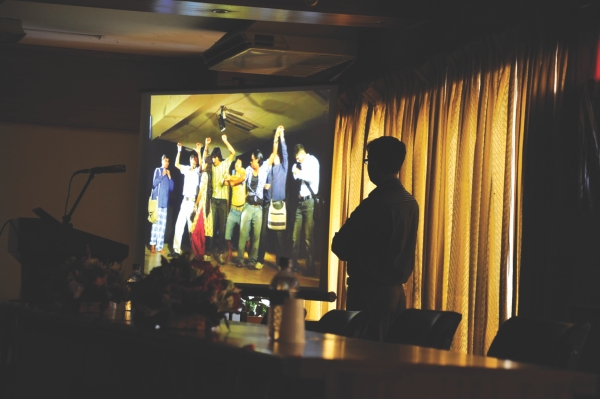In Rememberance
Man with a big smile and thirst for aesthetics
Abdus Selim
I was acquainted with Tareque Masud when he just got back from the United States. I cannot remember the year. It was a seminar on probably a theme like potentials and possibilities of Bangladeshi movies arranged by the Rainbow Film Society. He was one of the discussants on the paper presented by me. The first thing that caught my attention when I was introduced to him was his height and big smile. He was polite and all praises for the youth of our generation that fought so much to establish cinema as an important and influential form of art in a country where it is still considered insignificant. He was years younger to me but we came to like each other from day one. Our friendship became evident when we met each other on many occasions to discuss aesthetics of cinema in a number of forums and workshops arranged by film societies and film activists.

Tareque Masud and Catherine Masud are seen with the authour at a workshop held at North South University. Photo: NSU
I watched Muktir Gaan several times and a strong nostalgic surge deep within overwhelmed me every time I watched it afterwards. That was the aesthetic power of the documentary. Then came the feature film Maatir Moina. I had to see it a number of times for two reasons -- firstly, because it was undoubtedly one of the breakthroughs on the theme of our liberation war and secondly, being a member of the Bangladesh Oscar Committee, it was one of my prime duties to watch the movie on behalf of the selection committee. The movie was nominated to contest in the Oscar foreign language movies section. Though it did not bring any award for the country, I feel proud now to be one of the four committee members to put my signature on the nomination papers.
The most memorable time I passed with Tareque was when we went to Kolkata to show Maatir Moina. It was Dr Muzaffer Ahmed's collaborative project between Bangladesh and West Bengal for mutual understanding in the areas of art and culture called Ekok Maatra. It was his exclusive and individual effort and associated persons like Abdullah Abu Sayeed, Dr Syed Monjurul Islam, Mohammad Jahangir, Dr Mohammod Shahed and the likes in the project. I had the opportunity to accompany the team on two occasions and Tareque was invited to be with us on one such trip. In fact, I was given the responsibility to convince Tareque to go with the team. Dr Ahmed asked me to prepare a lecture on film making and film society movements in Bangladesh before the projection of the movie at Max Mueller Bhaban, Kolkata. Of course a question and answer session followed and Tareque and I had to face a number of odd questions from the audience. Overall, we enjoyed the session thoroughly and the final victory was ours for we were given a big round of applause from the audience.

During the workshop. Photo: NSU
But that was not all. During our three-night stay in Kolkata, Tareque and I were given the same room to share and that gave us the opportunity to know each other better. I got the rare chance to evaluate Tareque as an artist. Apart from being amiable, he was a wonderfully ever-accessible person to share ideas with. He talked about the making of Maatir Moina and about how the idea came to his mind. The movie is almost a direct and verbatim reflection of his life. He had a strict madrassa background, which ironically helped him tremendously in making the movie. Tareque said when he became an adult he led an unconventional life by not following his father's conventional views. He also talked about Catherine and how he met her and how his father made a point to convince him to marry her. He also confided in me about his plans to make a trilogy- the first of which turned out to be Noroshundar.
As I said, Tareque was an ever-accessible person because I got positive responses from him anytime I called him. He never failed to call me, send text messages or post invitation cards whenever he made a new film. He was ever-smiling and considerate regarding any proposal I put forward. We arranged two very fruitful and successful workshops with his help at North South University for the members of our Cine and Drama Club. Catherine was also present in one of the workshops. Unfortunately he could not answer my last call when I wanted him to be one of the judges for the short film competition that we organis ed for our students at NSU last month since he was out of the country. I would miss him so much for the rest of my life mostly because he did not answer my last call. Tareque Masud- a man with big a smile and thirst for aesthetics, you keep on smiling in the other world too but I will go on mourning for you ceaselessly as long as I live.
(The author is Assistant Professor, Department of English, North South University.)
| 